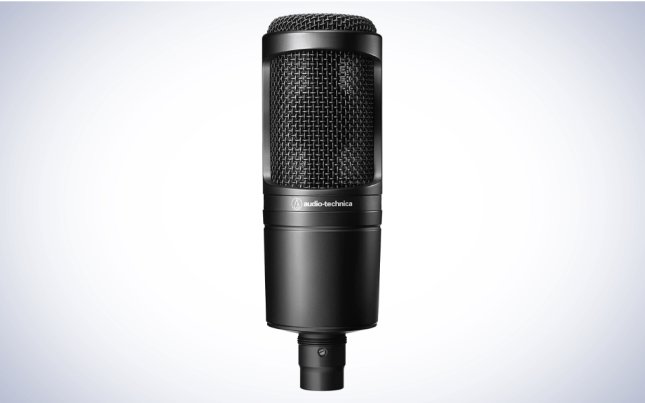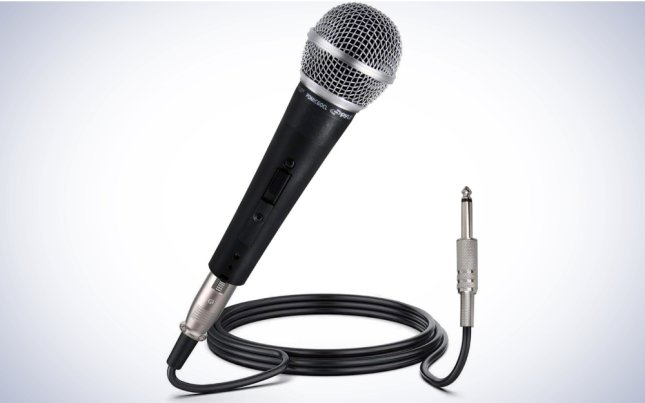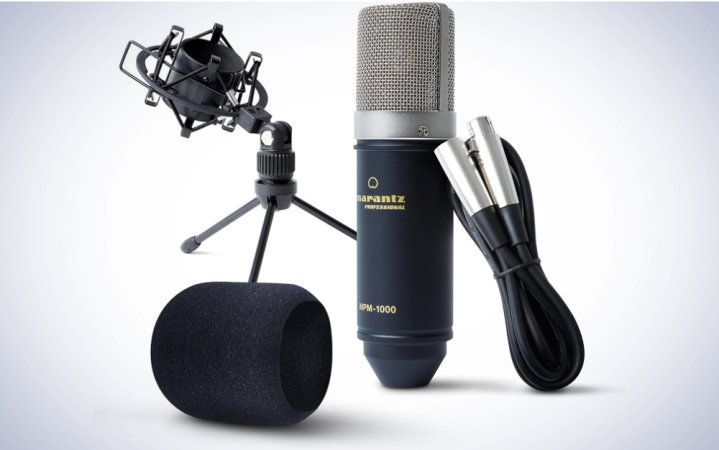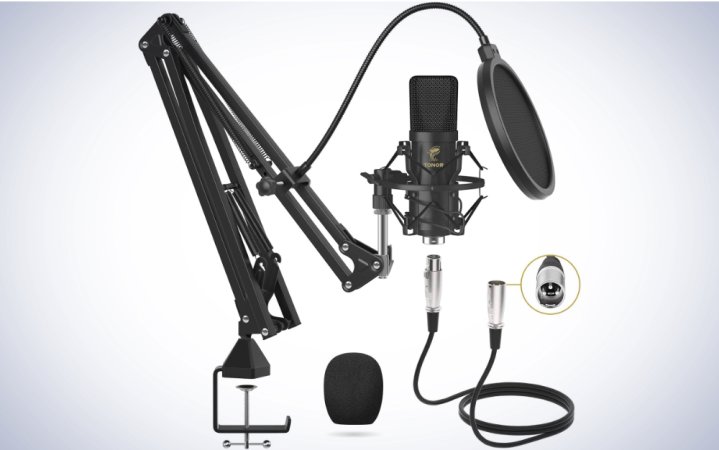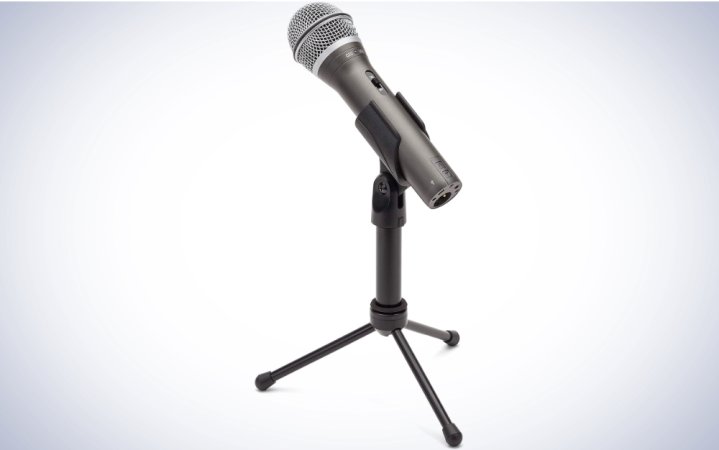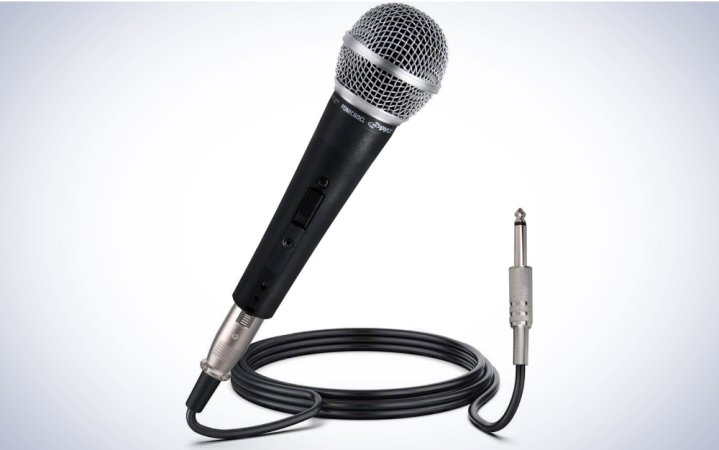We may earn revenue from the products available on this page and participate in affiliate programs. Learn more ›
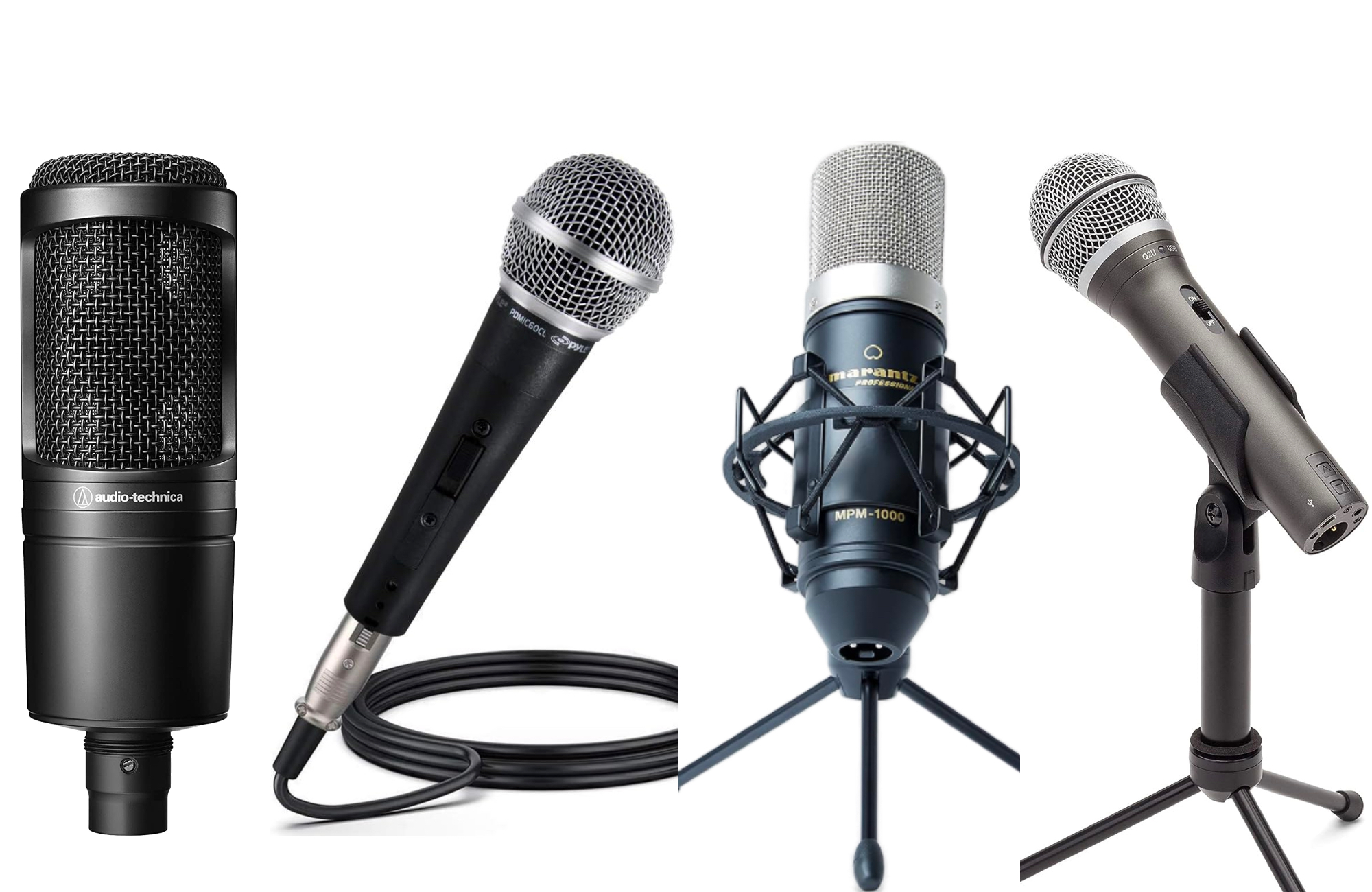
A cheap XLR microphone is one of the key pieces of gear you’ll need to start a podcast or lay down vocals on a track you’re working on. Expensive gear is nice, but you can get a lot of quality out of a mic that costs well under $100. XLR microphones are used by professional musicians and broadcasters worldwide due to their consistency and universal, interface-friendly connector. You’ll never have to worry about a software update accidentally breaking your microphone or that it will somehow become technically outdated. Instead, spending a couple of bucks today will allow you to use and appreciate this gear for years (if not decades) to come. And the best cheap XLR microphones will provide good enough results that you may never have to upgrade.
- Best overall: Audio-Technica AT2020
- Best for podcasts: Marantz MPM-1000
- Best kit: Tonor XLR Condenser Microphone
- Best USB-XLR combo: Samson Q2U
- Best budget: Pyle Professional Dynamic Vocal Microphone
How we chose the best cheap XLR microphones
When deciding which cheap XLR microphone recommendations to include in our guide, we considered the different reasons one may need to pick up a mic. Musicians and podcasters need slightly different equipment, though using the same XLR microphone for both cases can work. We also considered microphones that come with accessories like stands or arms, as these bundles can save you even more money when compared to picking up pieces of gear individually. The word cheap is relative, but we made sure all of the microphones we’re recommending cost under $100—the least expensive model below costs under $23. The SM7B is a standard, sure, but not everyone has $399 (or more) to spend on one component.
The best cheap XLR microphones: Reviews & Recommendations
Whether you want to finally start a podcast or go from songs you’ve recorded on your phone’s mic to making polished tracks, these are the best cheap XLR microphones to start a recording rig.
Best overall: Audio-Technica AT2020
Pros
- Sound source isolation
- Includes stand mount
- Part of a rich accessories ecosystem
Cons
- Price
Specs
- Microphone type: Condensor
- Weight: 1.32 pounds
- Price: $99
This is the most expensive XLR microphone we’re recommending, but if you can stretch your budget a bit, you’ll be rewarded with audio excellence. Audio-Technica’s AT2020 is a condenser microphone designed for broadcasters or vocalists to sound their best. Thanks to its cardioid pattern, the microphone will reject more unwanted sounds coming from the sides or rear, just picking up what you want: your voice. It comes with a mount, so you can easily attach it to any microphone stand, and can be oriented on its side for easy access. You may want to get a sturdy stand because the AT2020 is among the heaviest microphones we’re recommending. One reason we like Audio-Technica gear is that it tends to last a long time, and the company offers first-party accessories designed to work especially well with its own hardware. Getting the AT2020 today means you can build a studio-class audio setup piece by piece.
Best for podcasts: Marantz MPM-1000
Pros
- Directional cardioid mic capsule
- Includes shock mount, windscreen, and desktop stand included
- 20-20,000Hz frequency range
Cons
- Not a great choice for recording instruments
Specs
- Microphone type: $49
- Weight: .66 pounds
- Price: $49
For many podcasters, a USB microphone is their first, and often only, thought. But that limits them to a direct-to-laptop setup. If you want to be broadcasting on a budget without having your other hardware be limited, you won’t find a better cheap XLR microphone than Marantz’s MPM-1000. The mic comes with all the accessories you’ll need to sound your best on the go. All you’ll need to add to this bundle is an audio interface or mixer, and you’ll have a competent mobile recording setup with outboard processor access. The MPM-1000’s cardioid microphone capsule is oriented in such a way that the only sound being recorded will be your voice, and its frequency range captures the natural range of the human voice (and human hearing). The included windscreen will also act as a pop filter to prevent an unwanted frequency spike when you say words with the letter p in them. Marantz’s shock mount will keep the microphone from picking up unwanted distortion if it’s moved around while on a stand. You’re getting an exceptional amount of value from this bundle, given its $50 price tag, and you can up the ante by getting a package that includes a set of M-Audio headphones for under $90.
Best kit: Tonor XLR Condenser Microphone
Pros
- Includes a lot of helpful accessories
- 20Hz-20kHz frequency range
- Off-axis audio suppression
Cons
- You need a permanent recording space
Specs
- Microphone type: Condenser
- Weight: 4.19 pounds
- Price: $64.99
If you have enough room for a permanent recording area, this cheap XLR microphone from Tonor comes with most of what you’ll need to get started. The microphone itself was designed with off-axis audio suppression, which is its way of only capturing your voice rather than sounds happening around you. The microphone’s high-frequency range ensures voices of all pitches can be picked up accurately. This microphone is a fine choice on its own, but Tonor’s included accessories push it over the edge.
The pop filter will prevent harsh sounds from marring your recording when certain consonants are spoken, Tonor’s shock mount will prevent the microphone from shaking around too much when it’s moved, and Tonor even includes an XLR cable in the box. The most helpful accessory in this bundle is the microphone arm, which allows you to position Tonor’s cheap XLR microphone directly in front of your face at the perfect angle. This gives you the greatest chance of creating a high-quality recording and allows you to adjust your chair’s position while moving the mic in front of your face.
Best USB-XLR combo: Samson Q2U
Pros
- Great for recording instruments and vocals
- Can be connected directly to a computer if need be
- Has a built-in headphone jack for monitoring
Cons
- Price
Specs
- Microphone type: Dynamic
- Weight: .7 pounds
- Price: $69.99
While we’re highlighting cheap XLR microphones, Samson’s Q2U also offers USB connectivity, so you can plug the mic directly into your computer to create digital recordings. This is also the only microphone we recommend with a built-in headphone jack, so you can listen to the recordings you’re making in real-time to know whether you’ll need to move the microphone’s position or if a recording sounds off for some other reason. Samson includes both a pop filter and desktop stand with its microphone, so you’ll have a compact recording setup ready to go. The fact that you can use this as the backbone of an entire recording setup is especially great for beginning broadcasters or musicians without much room. Samson’s Q2U may be a little pricer than most of our other recommendations, but its versatility more than makes up for its cost. Want to up the build and sound quality? The Samson Q9U is a dynamic microphone that our reviewer found capable of handling high SPLs to vocal subtleties.
Best budget: Pyle Professional Dynamic Vocal Microphone
Pyle Professional Dynamic Vocal Microphone
Pros
- Includes long audio cable
- On and off switch
- Price
Cons
- Heavier
Specs
- Microphone type: Dynamic
- Weight: 1.32 pounds
- Price: $22.80
If you want an ultra-cheap XLR microphone for your first recording setup or need a secondary mic to keep in a gig bag, Pyle’s Professional Dynamic Vocal Microphone is the right choice. This unidirectional mic has a durable all-metal design, with an anti-dent ring along the middle of the microphone to prevent dings. The company says its built-in pop filter manages unwanted sounds well, so a standalone filter isn’t needed or included. In fact, the only accessory bundled with this mic is a 15-foot-long cable. The most clever part of this microphone’s design is its on-off switch, which is helpful if you’re performing music live and don’t want to risk feedback from the PA system when you’re not performing. It may be heavier than most of the microphones we’re recommending, but that’s the counterbalance to having an all-metal design. If you need the cheapest XLR microphone possible without settling for subpar sound, Pyle’s mic is the one.
What to consider when choosing the right cheap XLR microphone for you
There are many factors to keep in mind when choosing the best cheap XLR microphone for you. Below, you’ll find the ones we considered most important when selecting the microphones for this guide. Price was a factor, of course, as we highlight the best budget gear in this category, and these are the other things we thought about while picking microphones with our favorite mid-century connector:
Microphone type
Generally speaking, microphones can be categorized into two types: dynamic and condenser.
Dynamic microphones feature a Mylar diaphragm with a conductive coil attached to it. When sound waves vibrate the diaphragm, it moves the coil in a magnetic field, creating an AC voltage. As a result, dynamics are sometimes called moving-coil dynamic microphones. Live musicians typically use this mic style due to their durability and lower chance of distortion.
Condenser microphones feature a movable diaphragm attached to a fixed metal plate; both are charged and have electrodes attached. When sound waves hit the diaphragm, the distance between it and the plate changes, creating what’s called capacitance and resulting in small voltage changes that mimic the original wave. This microphone style has better high-frequency audio reproduction, which makes it better for picking up voices, which is especially helpful for broadcasters.
Weight
Weight is very important if you plan on holding your microphone while singing or recording a show. If a microphone is too heavy, it’ll cause fatigue. If it’s too light, you may unintentionally move it around a lot, leading to unwanted pops on your recording.
Accessories
If you’re starting your recording setup from scratch, a cheap XLR microphone may not be the only thing you’ll want to pick up. While some of our recommendations include accessories, you might need to consider things like a tabletop stand, pop filter, arm, and, most importantly, XLR cables. Getting a microphone bundle is also helpful because you know for a fact that all of these accessories will work with one another.
FAQs
An XLR microphone can be run indefinitely if connected to a mixer or audio interface.
This depends on the source of the unwanted noise. If you’re recording in a noisy environment, you may want to pick up a sound shield to provide insulation for the mic. If you’re hearing a buzzing sound, it may be a sign to change your cable, mixer, or audio interface.
Yes. XLR microphones are used by professional musicians and broadcasters. They’re the go-to choice because of their longevity and consistency.
This depends on its feature set, but our recommendations range from $23 to $100.
Final thoughts on the best cheap XLR microphones
- Best overall: Audio-Technica AT2020
- Best for podcasts: Marantz MPM-1000
- Best kit: Tonor XLR Condenser Microphone
- Best USB-XLR combo: Samson Q2U
- Best budget: Pyle Professional Dynamic Vocal Microphone
A cheap XLR microphone can serve you well for many years, and will become the cornerstone of your recording setup. It’s a lo-fi tool you can confidently bring into any recording studio or music venue, with a guarantee you’ll be able to plug it into the house system to get the sound you’re familiar with. You can even continue using your cheap XLR microphone as you upgrade other pieces of gear in your recording setup.
